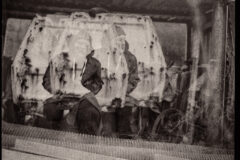“This is the cutest thing, but I was interviewing Ihsahn from [Norwegian death metal band] Emperor and I thought I’d recorded it,” Fight Like Hell: The Untold History of American Labor author Kim Kelly says with a laugh, “I realized halfway through — he was in Norway and this is in the early 2000s — that my recorder wasn’t working. He just says, ‘Oh, it’s okay, I will just speak very slowly and you can write down what I’m saying’.”
It’s early afternoon, and Kelly is in between interviews for her book’s release. Her story about Isahn is just one of many memories from her years working in the music industry. Fight Like Hell, on the other hand, is a book about intersectional labor movements throughout history — a collection of stories painstakingly researched and expertly told.
These days, Kelly is a champion of workers rights who uplifts the voices of people often overlooked by the world around them. Given the success Kelly has seen as a respected voice in labor reporting, some may not realize that she initially made a name for herself as one of the foremost metal writers in North America. And as a child of the late ‘90s/early ‘00s, the first scene that really spoke to Kelly was the much-maligned nü metal.
“Linkin Park, Powerman 5000, Slipknot,” Kelly rattles off as some of her early favorites. “Anything that was loud and angsty and angry.”
Her love of metal led her to congregate among the other goth, metal and punk kids in her high school — a gateway drug to jersey mall culture and hot topic aesthetics.
“I was never a proper goth, but I definitely did some interesting things with eyeliner,” Kelly points out. “Then I realized that I could sleep later in the morning if I didn’t do all that stuff.”
From a labor perspective, the dishwashing job Kelly took when she was 16 served as “a rude awakening to the realities of the American workforce.” But even then, she was already writing about music for her school newspaper’s Teen Voices section — handling both reviews and semi-willing interviews with acts like Virginia grindcore band Pig Destroyer or the Polish metalheads in Behemoth after cornering them at merch tables and asking to interview them.
After high school, Kelly attended Drexel University as a music industry major with a minor in world history and politics. But instead of struggling through her final math classes in summer school and graduating, Kelly chose to put her major to use and go on a six-week tour with her friend’s band, Dark Castle.
“It was exhilarating, sometimes terrible and an absolute education,” she says. “I was 22 and I just wanted to go on an adventure. I would wake up hungover and be in the van all day, work the show, count out the merch, drink too much and then go back to a hotel or somebody’s house and stay up until 3:00 writing reviews or interviewing people or whatever needed to be done.”
With her political consciousness growing, Kelly’s work also began addressing inequalities she saw reflected in the scenes around her.
“All of these really disgusting, dark spots in our communities were making metal less accessible to everybody,” Kelly says. “We’re all misfits, outcasts and weirdos. It just seemed unconscionable to me that some weirdos were accepted and some weren’t.”
When Kelly wrote “Every story is a labor story” in the prologue of Fight Like Hell, one could say she was also speaking of her own journey from metal writer to organized labor reporter. Time spent at Noisey ensconced Kelly in the collective fight to organize a union amongst its workers, and that quickly became all-encompassing. She soon found herself more involved in New York’s activist scene, attending labor protests and demonstrations.
“The union was my favorite band,” Kelly laughs. “I was spending more time at union meetings than at metal shows. I was learning more about the labor movement, the ins and outs of labor law, and seeing the way that exploitation, inequities and these historic wrongs still impact so many workers today. I was rapidly realizing I’d gone from being a metal journalist with a political view to a political journalist who was really into heavy metal.”
With her newfound passion roaring, Kelly’s tenure at Noisey was (unbeknownst to her) winding to a close. But even as a metal journalist, the tone of her reporting was already starting to shift. Her work began to focus more on anti-fascism and anti-racism within the metal scene, so when she was suddenly let go, it became an opportunity for something new.
“It was getting laid off in 2019 that kind of kicked me in the ass,” Kelly says, “I thought ‘Okay, if you want to do this, you’ve got to do this now because you’re free.’”
A year after being let go (along with 250 others), she signed a contract to write what would become Fight Like Hell.
From metal fans to laborers to organizers, these people all matter to Kelly because she is from them. She holds love and respect for them, regardless of what she’s reporting on. Particularly with Fight Like Hell, Kelly’s work has bridged these seemingly disparate worlds, because they all share a commonality — and one she views as her mission statement,
“People are far too often looked down on in modern society because they haven’t achieved these status markers that other people have deemed so necessary to being a full, respectable human in this country,” Kelly says. “But what if we don’t care? What if we don’t want those status markers? What if that isn’t what we’re doing this for? If you’re a metal fan, or a construction worker, or a domestic worker — if you’re scraping by and trying to squeeze every little bit of joy you can add out of your short life — why the fuck should you care about what some fancy asshole thinks of you?”





